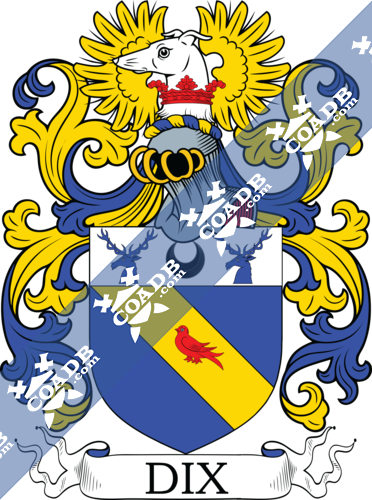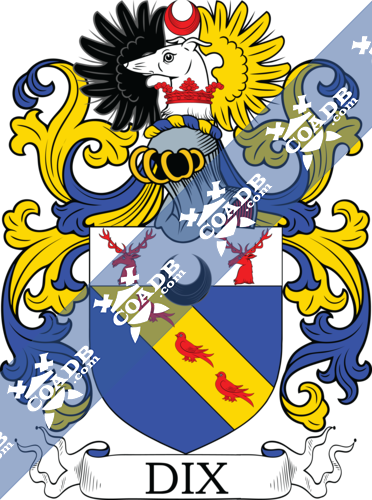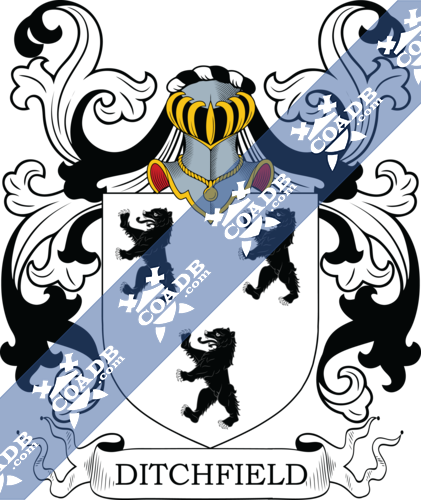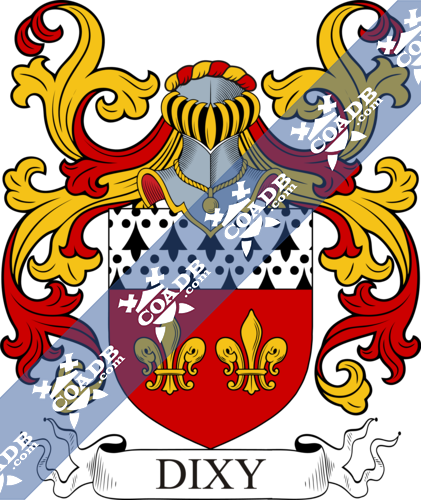Dix Family Crest, Coat of Arms and Name History

Dix Coat of Arms Gallery
Don’t know which Coat of Arms is yours?
We can do a genealogical research. Find out the exact history of your family!
Learn MoreDIX
The medieval English surname Dix is a variation of the surname Dick, both names were a diminutive of the given name Richard which derived from the ancient Germanic word “ric” which translated to strong or brave. The name gained in popularity in England after the Norman invasion. In this context the name would be considered patronymic.
The variations in the spelling of the surname includes; Dix; Dixx; Dixson; Dickson; Dikson; and Dicson among others. The variations in spelling of surnames dating back to ancient times can be attributed to a lack of consistency regarding guidelines for spelling in use by the scribes who recorded such information, many of which were in the habit of spelling phonetically. The issue of multiple spellings of names in records was compounded by the diversity of languages in use in European countries at this time.
Until the Norman invasion and conquest, surnames were rarely if ever used. In the small settlements and villages which existed during earlier times in most of Britain, residents found little need for surnames as everyone in these communities knew each other and a given name would usually suffice. However, as communities grew and people began to migrate on a larger scale, along with the need of the government having a reliable way to track people for tax and census purposes, the Norman aristocracy’s penchant for using surnames seemed the appropriate evolution to this problem. In most instances to distinguish themselves, one from another, those not of the noble class would often be identified by their given name plus their occupation while others may have been identified by their given name and one of their parent’s names. There was a boundless supply from which surnames could be formed, in addition to the use of patriarchal/matriarchal names or reference to the individuals occupation, there were things such as defining physical traits, a familiar geographical location or a topographical landmark found near the individual’s home or birthplace, the name of the village in which the person lived, and so much more. Over the course or time, surnames would come not just to represent an individual but whole families.
One of the earliest record of any variation of this surname is that of William Dyckes which appears in the Norfolk tax rolls from 1362. The tax rolls, were a series of census and tax records kept by the English Treasury by order of King Edward III. These documents, the oldest dating back seven hundred years to the 12th century, are considered the oldest continuous set of records detailing English governance in the United Kingdom.
The task of record keeping was primarily the responsibility of the churches, priories, and government as literacy was often a skill found only among the wealthy, the clergy, and those in government. For practical purposes, governments found the use of surnames made the recording and tracking of people for census, taxation, and immigration purposes easier.
With the discovery of America, people began to immigrate to the “New World”. Some of the first recorded immigrants to America bearing the surname were Anthony Dix who arrived in 1623 and settled in Massachusetts. Henry Dix landed in 1633 and settled in Virginia.
There were also immigrants to the British Commonwealth countries of Canada, Australia, and New Zealand bearing the surname. James Dix was one of the early settlers to Australia, arriving in 1824 and settling in New South Wales. James and Sarah Dix along with their children, Lydia and Edward were early settlers to New Zealand, arriving in 1840 and settling in Adelaide.
Worldwide, the highest concentration of people with the surname Dix are found in the United Kingdom, Australia, New Zealand, the United States, and Germany. By state, the largest percentile of those with the surname Dix live in Michigan, Vermont, Virginia, Illinois, and Iowa.
There are many persons of note who bear the surname such as American born, John Adams Dix. He served as the Secretary of the Treasury under President Buchanan, He was President of the Mississippi and Missouri Railroad, served as Post Master Of New York City, Secretary of State of New York, Governor of New York, and as a General in the Union Army during the American Civil War. The US Army post Ft. Dix is named for him.
Blazons & Genealogy Notes
1) Az. on a bend or, a martlet gu. on a chief ar. a crescent sa. betw. two stags’ heads couped of the field. Crest—A greyhound’s head ar. ducally gorged gu. betw. two wings or.
2) (confirmed by Camden, Clarenceux, 1612, to Rev. John Dix, D.D.). Az. on a bend or, three martlets gu. on a chief ar. two stags’ heads erased gu., a crescent for diff. Crest—A greyhound’s head erased ar. ducally gorged gu. betw. two wings, dexter sa., sinister or, a crescent for diff.








